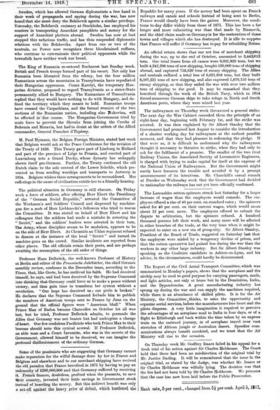The railwaymen on Thursday week threatened a general strike. The
next day the War Cabinet conceded them the principle of an eight-hour day, beginning with February lst, and the strike was averted. It was then explained by Sir Albert Stanley that the Government had promised last August to consider the introduction of a shorter working day for railwaymen at the earliest possible moment, and that they had pleasure in redeeming the pledge. If that were so, it Is difficult to understand why the railwaymen thought it necessary to threaten to strike, when they had only to ask for the fulfilment of a promise. The smaller of the two rival Railway Unions, the Associated Society of Locomotive Engineers, is charged with trying to make capital for itself at the expense of the National Union of Railwaymen. But the Government might surely have foreseen the trouble and avoided it by a prompt announcement of its intentions. Mr. Churchill's casual remark at Dundee on Wednesday week that the Government had decided to nationalize the railways has not yet been officially confirmed.






































 Previous page
Previous page